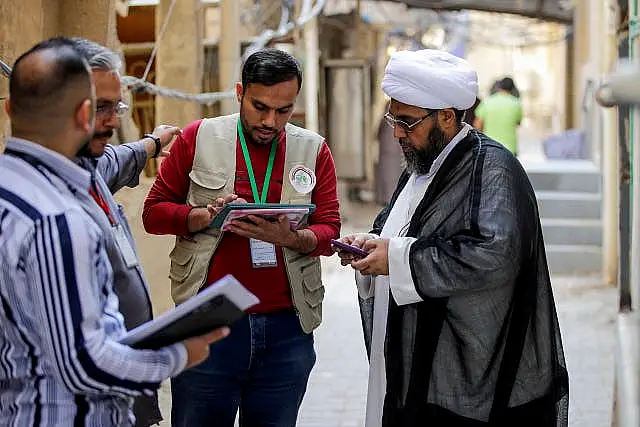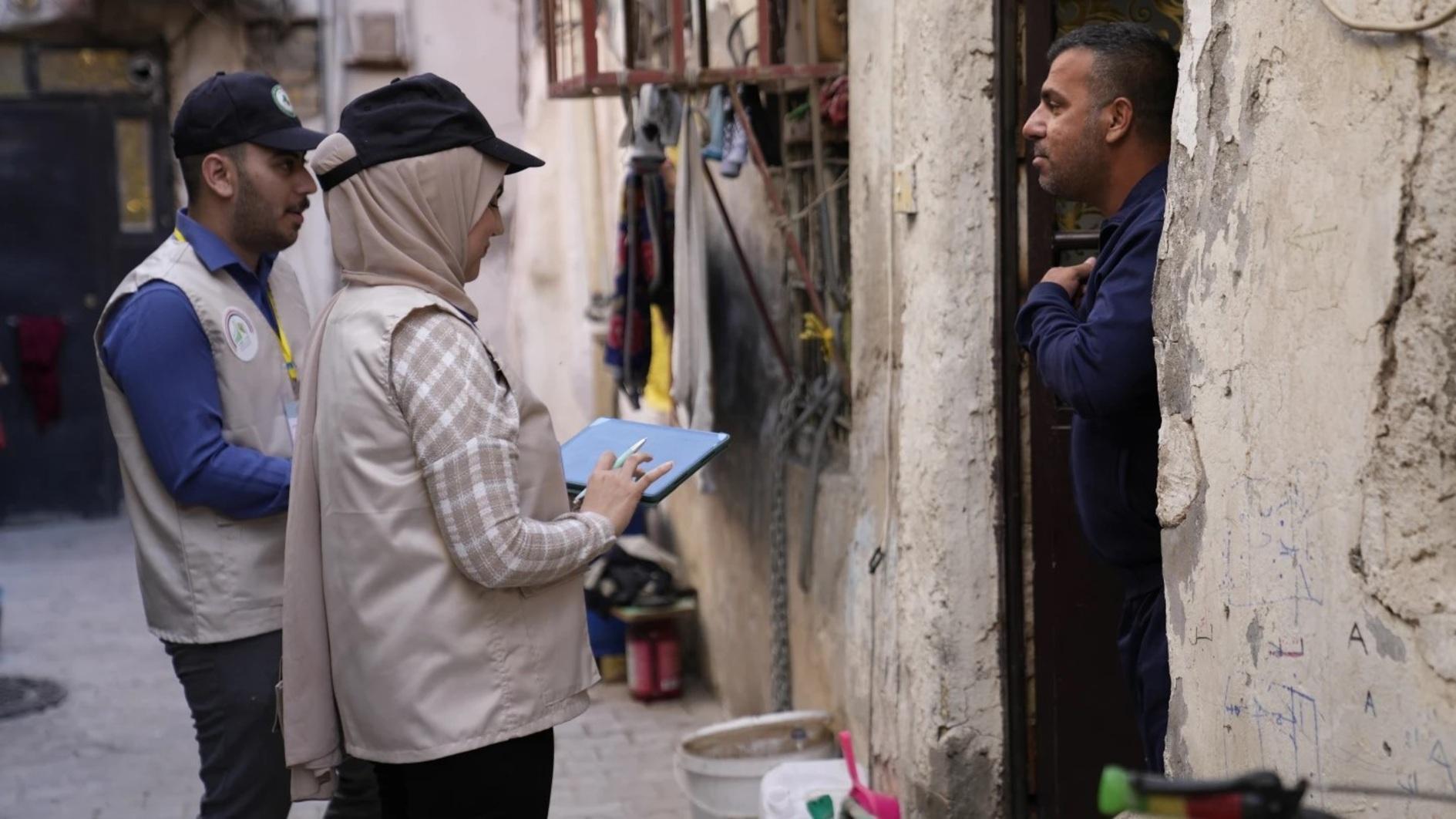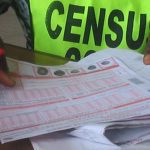Iraq has launched its first nationwide population census in decades, in an effort to modernise data collecting and planning in a country long plagued by conflict and political differences.
The act of counting the people has also caused controversy, as the census is likely to have far-reaching consequences for Iraq’s resource distribution, budget allocations, and development plans.
Minority groups are concerned that a documented reduction in their numbers will result in less political influence and fewer economic rewards under the country’s sectarian power-sharing framework.

The figure in areas such as Kirkuk, Diyala, and Mosul, where control is disputed by the central government in Baghdad and the semi-autonomous Kurdish regional administration in the north, has sparked widespread concern.
According to Ali Arian Saleh, executive director of the census at Iraq’s Ministry of Planning, agreements on how to conduct the count in the disputed territories were achieved during talks attended by Iraq’s Prime Minister, President, and senior Kurdish authorities.
The last nationwide census in Iraq was held in 1987. Another one held in 1997 excluded the Kurdish region.
The new census lays out a development plan for the future and delivers a message of stability,” Planning Minister Mohammed Tamim said in a televised speech.
According to officials, the census will be the first to use new technologies for data collection and analysis, delivering a complete picture of Iraq’s demographic, social, and economic scene.

Approximately 120,000 census workers will conduct two-day surveys of households across the country, each covering approximately 160 dwelling units.
During the census period, the Interior Ministry issued a nationwide curfew, restricting movement of persons, automobiles, and trains between cities, districts, and rural areas, with exceptions for humanitarian reasons.
Iraq has launched its first nationwide population census in decades, in an effort to modernise data collecting and planning in a country long plagued by conflict and political differences.
The act of counting the people has also caused controversy, as the census is likely to have far-reaching consequences for Iraq’s resource distribution, budget allocations, and development plans.
Minority groups are concerned that a documented reduction in their numbers will result in less political influence and fewer economic rewards under the country’s sectarian power-sharing framework.

The figure in areas such as Kirkuk, Diyala, and Mosul, where control is disputed by the central government in Baghdad and the semi-autonomous Kurdish regional administration in the north, has sparked widespread concern.
According to Ali Arian Saleh, executive director of the census at Iraq’s Ministry of Planning, agreements on how to conduct the count in the disputed territories were achieved during talks attended by Iraq’s Prime Minister, President, and senior Kurdish authorities.
The last nationwide census in Iraq was held in 1987. Another one held in 1997 excluded the Kurdish region.
The new census lays out a development plan for the future and delivers a message of stability,” Planning Minister Mohammed Tamim said in a televised speech.
According to officials, the census will be the first to use new technologies for data collection and analysis, delivering a complete picture of Iraq’s demographic, social, and economic scene.

Approximately 120,000 census workers will conduct two-day surveys of households across the country, each covering approximately 160 dwelling units.
During the census period, the Interior Ministry issued a nationwide curfew, restricting movement of persons, automobiles, and trains between cities, districts, and rural areas, with exceptions for humanitarian reasons.
Iraq has launched its first nationwide population census in decades, in an effort to modernise data collecting and planning in a country long plagued by conflict and political differences.
The act of counting the people has also caused controversy, as the census is likely to have far-reaching consequences for Iraq’s resource distribution, budget allocations, and development plans.
Minority groups are concerned that a documented reduction in their numbers will result in less political influence and fewer economic rewards under the country’s sectarian power-sharing framework.

The figure in areas such as Kirkuk, Diyala, and Mosul, where control is disputed by the central government in Baghdad and the semi-autonomous Kurdish regional administration in the north, has sparked widespread concern.
According to Ali Arian Saleh, executive director of the census at Iraq’s Ministry of Planning, agreements on how to conduct the count in the disputed territories were achieved during talks attended by Iraq’s Prime Minister, President, and senior Kurdish authorities.
The last nationwide census in Iraq was held in 1987. Another one held in 1997 excluded the Kurdish region.
The new census lays out a development plan for the future and delivers a message of stability,” Planning Minister Mohammed Tamim said in a televised speech.
According to officials, the census will be the first to use new technologies for data collection and analysis, delivering a complete picture of Iraq’s demographic, social, and economic scene.

Approximately 120,000 census workers will conduct two-day surveys of households across the country, each covering approximately 160 dwelling units.
During the census period, the Interior Ministry issued a nationwide curfew, restricting movement of persons, automobiles, and trains between cities, districts, and rural areas, with exceptions for humanitarian reasons.
Iraq has launched its first nationwide population census in decades, in an effort to modernise data collecting and planning in a country long plagued by conflict and political differences.
The act of counting the people has also caused controversy, as the census is likely to have far-reaching consequences for Iraq’s resource distribution, budget allocations, and development plans.
Minority groups are concerned that a documented reduction in their numbers will result in less political influence and fewer economic rewards under the country’s sectarian power-sharing framework.

The figure in areas such as Kirkuk, Diyala, and Mosul, where control is disputed by the central government in Baghdad and the semi-autonomous Kurdish regional administration in the north, has sparked widespread concern.
According to Ali Arian Saleh, executive director of the census at Iraq’s Ministry of Planning, agreements on how to conduct the count in the disputed territories were achieved during talks attended by Iraq’s Prime Minister, President, and senior Kurdish authorities.
The last nationwide census in Iraq was held in 1987. Another one held in 1997 excluded the Kurdish region.
The new census lays out a development plan for the future and delivers a message of stability,” Planning Minister Mohammed Tamim said in a televised speech.
According to officials, the census will be the first to use new technologies for data collection and analysis, delivering a complete picture of Iraq’s demographic, social, and economic scene.

Approximately 120,000 census workers will conduct two-day surveys of households across the country, each covering approximately 160 dwelling units.
During the census period, the Interior Ministry issued a nationwide curfew, restricting movement of persons, automobiles, and trains between cities, districts, and rural areas, with exceptions for humanitarian reasons.
Iraq has launched its first nationwide population census in decades, in an effort to modernise data collecting and planning in a country long plagued by conflict and political differences.
The act of counting the people has also caused controversy, as the census is likely to have far-reaching consequences for Iraq’s resource distribution, budget allocations, and development plans.
Minority groups are concerned that a documented reduction in their numbers will result in less political influence and fewer economic rewards under the country’s sectarian power-sharing framework.

The figure in areas such as Kirkuk, Diyala, and Mosul, where control is disputed by the central government in Baghdad and the semi-autonomous Kurdish regional administration in the north, has sparked widespread concern.
According to Ali Arian Saleh, executive director of the census at Iraq’s Ministry of Planning, agreements on how to conduct the count in the disputed territories were achieved during talks attended by Iraq’s Prime Minister, President, and senior Kurdish authorities.
The last nationwide census in Iraq was held in 1987. Another one held in 1997 excluded the Kurdish region.
The new census lays out a development plan for the future and delivers a message of stability,” Planning Minister Mohammed Tamim said in a televised speech.
According to officials, the census will be the first to use new technologies for data collection and analysis, delivering a complete picture of Iraq’s demographic, social, and economic scene.

Approximately 120,000 census workers will conduct two-day surveys of households across the country, each covering approximately 160 dwelling units.
During the census period, the Interior Ministry issued a nationwide curfew, restricting movement of persons, automobiles, and trains between cities, districts, and rural areas, with exceptions for humanitarian reasons.
Iraq has launched its first nationwide population census in decades, in an effort to modernise data collecting and planning in a country long plagued by conflict and political differences.
The act of counting the people has also caused controversy, as the census is likely to have far-reaching consequences for Iraq’s resource distribution, budget allocations, and development plans.
Minority groups are concerned that a documented reduction in their numbers will result in less political influence and fewer economic rewards under the country’s sectarian power-sharing framework.

The figure in areas such as Kirkuk, Diyala, and Mosul, where control is disputed by the central government in Baghdad and the semi-autonomous Kurdish regional administration in the north, has sparked widespread concern.
According to Ali Arian Saleh, executive director of the census at Iraq’s Ministry of Planning, agreements on how to conduct the count in the disputed territories were achieved during talks attended by Iraq’s Prime Minister, President, and senior Kurdish authorities.
The last nationwide census in Iraq was held in 1987. Another one held in 1997 excluded the Kurdish region.
The new census lays out a development plan for the future and delivers a message of stability,” Planning Minister Mohammed Tamim said in a televised speech.
According to officials, the census will be the first to use new technologies for data collection and analysis, delivering a complete picture of Iraq’s demographic, social, and economic scene.

Approximately 120,000 census workers will conduct two-day surveys of households across the country, each covering approximately 160 dwelling units.
During the census period, the Interior Ministry issued a nationwide curfew, restricting movement of persons, automobiles, and trains between cities, districts, and rural areas, with exceptions for humanitarian reasons.
Iraq has launched its first nationwide population census in decades, in an effort to modernise data collecting and planning in a country long plagued by conflict and political differences.
The act of counting the people has also caused controversy, as the census is likely to have far-reaching consequences for Iraq’s resource distribution, budget allocations, and development plans.
Minority groups are concerned that a documented reduction in their numbers will result in less political influence and fewer economic rewards under the country’s sectarian power-sharing framework.

The figure in areas such as Kirkuk, Diyala, and Mosul, where control is disputed by the central government in Baghdad and the semi-autonomous Kurdish regional administration in the north, has sparked widespread concern.
According to Ali Arian Saleh, executive director of the census at Iraq’s Ministry of Planning, agreements on how to conduct the count in the disputed territories were achieved during talks attended by Iraq’s Prime Minister, President, and senior Kurdish authorities.
The last nationwide census in Iraq was held in 1987. Another one held in 1997 excluded the Kurdish region.
The new census lays out a development plan for the future and delivers a message of stability,” Planning Minister Mohammed Tamim said in a televised speech.
According to officials, the census will be the first to use new technologies for data collection and analysis, delivering a complete picture of Iraq’s demographic, social, and economic scene.

Approximately 120,000 census workers will conduct two-day surveys of households across the country, each covering approximately 160 dwelling units.
During the census period, the Interior Ministry issued a nationwide curfew, restricting movement of persons, automobiles, and trains between cities, districts, and rural areas, with exceptions for humanitarian reasons.
Iraq has launched its first nationwide population census in decades, in an effort to modernise data collecting and planning in a country long plagued by conflict and political differences.
The act of counting the people has also caused controversy, as the census is likely to have far-reaching consequences for Iraq’s resource distribution, budget allocations, and development plans.
Minority groups are concerned that a documented reduction in their numbers will result in less political influence and fewer economic rewards under the country’s sectarian power-sharing framework.

The figure in areas such as Kirkuk, Diyala, and Mosul, where control is disputed by the central government in Baghdad and the semi-autonomous Kurdish regional administration in the north, has sparked widespread concern.
According to Ali Arian Saleh, executive director of the census at Iraq’s Ministry of Planning, agreements on how to conduct the count in the disputed territories were achieved during talks attended by Iraq’s Prime Minister, President, and senior Kurdish authorities.
The last nationwide census in Iraq was held in 1987. Another one held in 1997 excluded the Kurdish region.
The new census lays out a development plan for the future and delivers a message of stability,” Planning Minister Mohammed Tamim said in a televised speech.
According to officials, the census will be the first to use new technologies for data collection and analysis, delivering a complete picture of Iraq’s demographic, social, and economic scene.

Approximately 120,000 census workers will conduct two-day surveys of households across the country, each covering approximately 160 dwelling units.
During the census period, the Interior Ministry issued a nationwide curfew, restricting movement of persons, automobiles, and trains between cities, districts, and rural areas, with exceptions for humanitarian reasons.














